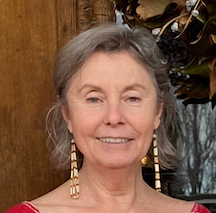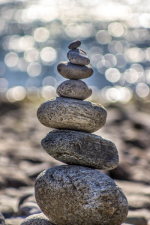by Prajna
At the beginning of the description of my monthly workshop, there’s a quote from Chogyam Trumpa.
“You begin with ambition of some kind. Then, at a certain stage, meditation becomes instinctive. Then you cannot not meditate – it happens to you.”
This is actually true. The cultivation of mindfulness becomes pervasive. If you’re sincere, at some point you’ll see that you can’t not know what you’re doing. But the refinement of a meditation practice, of wise mindfulness, of wise concentration and of wise effort, doesn’t stop. It seems to be an evolution that’s ongoing. There’s always space to deepen, soften, clarify, always the new moment to open to.
I’ve been meditating regularly since around 1974, which is closing in on 50 years, so I have a lot of experience and have accumulated a lot of technique. I practiced in two very different traditions before settling into a Buddhist Insight Tradition about 34 years ago and I’ve been fortunate to be with great teachers. Some of the most helpful things I’ve learned about meditation have been from other meditation students, from the questions they’ve asked teachers, or from hearing what people shared during group discussions. This was my basic motivation in leading a meditation group, the hope that we could share our practices and support each other in deepening.
Surprisingly, this isn’t an easy thing to do. The ability to articulate personal practice is something that has to be learned, something that there aren’t always words for. How do we talk about what’s happening when we sit down and try to restrain the modifications of the mind stuff? How do we discuss the interior landscape? It’s much easier to try and discuss some aspect of practice than to share this ongoing space out, feel something, go away, come back, start again, drop in deeper, what’s that, bring in some kindness, get lost, see clearly, rest in the body, heart opening, get sidetracked, feel gratitude, touch something huge, obsess on an itch, on and on with a million variations sometimes deepening and sometimes skittering on the surface – this experiential thing that happens when we sit down to meditate.
I’ve spent a good amount of time on meditation retreats. And during retreat, one of the valuable things that can happen is getting to meet privately with a teacher every few days, usually for 10 or 15 minutes. Unfortunately, this tradition is becoming rarer, but, fortunately for me, it was the norm for my first 20 or so years of practice. You’d come in to see the teacher, sit down and eventually they’d say something like, ‘well, how’s it going’ and then you’d talk about how it was going. They’d make sure you weren’t getting lost, but mainly they shared the territory, maybe gave a little advice or feedback, articulated something for you or not. Once I went in to see Phillip Moffitt – there had been a kind of blockage in my sitting- almost like something in my energy body was in the way and I told him, in a kind of stutter – ‘there’s something there, in the way, I don’t know what’ and we both closed our eyes for a minute and meditated together and he said, ‘oh yeah I can feel it.’ And he didn’t really give me any advice but to let it be there and sit with it without making up a story. And of course, eventually, one day, it was gone. But he validated my reality and knew I could handle it and I felt supported. You can learn a lot from 10 minutes with a teacher, even though it might not be something you can put into words.
So, there’s not always a vocabulary and there’s also not always the need for one. But sometimes it can help to not be alone with our experience. I think there’s a real value in people coming together and talking about their practice, both on and off the cushion. I know, with our friends, with our real sangha of like minded people, we talk about our practice off the cushion. We try to find ways to navigate this life, this world, with moral and spiritual values. That’s real friendship. And I want to encourage us to really try and bring what we sit with in meditation out and share that too. We can learn from and support each other by sharing our sitting practices.
Because the older schools of meditation have thousands of years of watching what happens, there are techniques and ways of dealing with almost anything. We don’t exactly have to re-invent the wheel. But we do have to develop enough skill to know what’s going on in an interior landscape that can sometimes feel like a jungle, and this is cultivated one moment at a time, usually incrementally. One of the reasons I wanted to lead a practice group was because it just seemed like it could be so helpful to share our wisdom, to pool our resources. There are many things that took a long time to become clear to me. Sometimes things that I heard people say twenty or thirty years ago became clear because I was finally able to recognize the landscape of what they were referring to. “Just sit” was something I heard early on, but it’s something that I think requires quite a bit of skill. Just sitting without much skill was kind of how I’d already lived a lot of my life. I had to wait a long time before letting go of technique was feasible. There needs to be some real intuitive feel for the territory before letting go of the map.
This January will be my last 3rd Wednesday for a while. On one level, I don’t really feel like I’ve been successful in the workshop. We haven’t found a way to talk regularly, or deeply, about our individual sitting practices, but I am very grateful to the people who’ve come and been part of the workshops and to IYI for providing the space. It’s given me a way to take a close look at various facets of practice and to share them through the lens of my own experience and to then interact with people through their own experience. And we did get to share our wisdom, and at times, to open our hearts and minds.
So a big thank you to the IYI community and may we all practice sincerely, for our own benefit and for the benefit of all beings.

Prajna lives, practices, cooks and teaches as San Francisco IYI
Please join Prajna for her Deepening into Meditation workshop on Wed. January 19 @ 6:30 pm – 7:30 pm PT.

